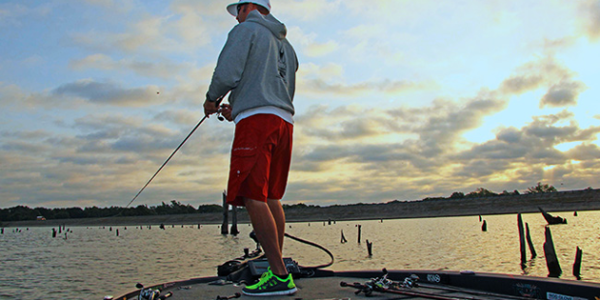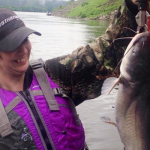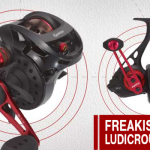Contributed Story
Alabama’s Gerald Swindle is in his 18th year as a pro angler. He’s competed from California to Vermont and won more than $2 Million dollars. Yet he had never been to famous Lake Fork until he began practicing for the Toyota Texas Bass Classic in May of 2014.
Here’s a look at how the 2004 Toyota Bassmaster Angler of the Year approached the 27,000-acre reservoir that’s produced 12 of the Top 20 biggest largemouth ever caught in Texas.
Time and Temp
“The first thing I want to know at this time of the year is what phase of the spawn the fish are in – and knowing the water temp is a real good place to start in finding out the answer to that,” says Swindle.
After a very harsh winter, Fork’s bass are running about a month behind based on water temps that are still in the high 60s to low 70s. Swindle knows that those are ideal spawning temperatures, and sure enough, while some bass are post-spawn, many fish are still on beds or guarding fry hatched just days ago.
Shallow to Deep, Deep to Shallow
“Eventhough I know there are plenty of fish up there ‘dirt shallow’, I started looking for deep fish on secondary points, humps and roadbeds just out from the spawning flats, by just riding and looking at my Humminbird 1198c,” says Swindle. “Seeing fish shallow is pretty easy, but finding ‘the motherload’ school of big post-spawners that you can win with takes a lot more time to find.”
Unfortunately Swindle never found what he was looking for out deep, so he began pushing shallower. “When I got into 6-feet of water, I could see some still on beds, and caught a few good ones on Booyah’s vibrating swim jig.”
The Hunt is a Hard One
Swindle rides around for close to an hour at mid-day. Scrambling. Looking with both his eyes and sonar. “This water up here is too stained and muddy for me, so this will be my first and last ride up the river on Fork,” he says as he points his Triton south to cleaner water to keep looking. “Those flat, expansive, muddy creeks up river lack contour. It’d take me two years to locate a school in these flooded trees, and I only have two days.”
“I scramble a lot out here, because I get run out of the pocket a lot – you what I mean?” Hard evidence of his rushing around can be found between the 17 Quantum rods and reels he touches in the course of this particular practice day.
For the record, they include: a Zara Spook, shallow jerkbait, double willow leaf spinnerbait, ¾ ounce jig for punching through thick and shallow vegetation, a topwater frog, a crankbait that will dredge 14’, ½-ounce pitching jig, vibrating blade jig, a crankbait that will touch 10’, a swimming jig, a buzzbait, a 3/4 –ounce pitching jig, a soft 6” California style swimbait, a squarebill crankbait, a Zoom speed worm, and even a Carolina rig.
The pattern within the pattern
“Eventhough you find fish shallow, I can’t stress enough to the beginning angler to pay attention to the details – what we call ‘the pattern within the pattern’,” says Swindle.
“For example, it’s not enough to know you caught three bass in a shallow cove on a chatterbait,” he warns. “The questions you need to ask are, what were they living on in that cove? Stumps? Vegetation? Big Stumps? Any ol’ stump? What kind of vegetation? Exactly how deep? And then go to different parts of the lake to try to replicate that pattern.”
Swindle will also continue to drift deeper to search some more. “By the end of three days of practice I’m either gonna be on a shallow water pattern that I’ve got a ton of confidence in, or a highly specific deep water spot or two in 10 to 20 feet of water where the motherload lives.”
The hunt is a hard one
“At the end of 12 hours of looking for a winning pattern, I’m mentally and physically exhausted. It ain’t all butterflies and puppy dogs out here,” says the tell-it-like-it-is pro, as Eric Church songs play from an iPhone to keep him company during the long lonely practice day.
By 7:00 p.m., Swindle is indeed toast. He began at sunrise, and as the sun sets, he’s hit the wall mentally and physically. He caught one bass that pushed 6-pounds on a deep crankbait, but try as he might, he could not catch another one from that deep structure location, nor any other deep spot. So he’ll roll into the next day with confidence gained from the handful of 3 to 5 pounders he plucked from stumps and vegetation in less than 5-feet of water. But it won’t be enough to win. So the search continues.
A 12 hour day, 17 rods, and aggravating wind gusts to 25 mph that bounced Swindle and his boat off shallow stumps like a ping pong ball … all in an effort to find the massive 30-pound limits Lake Fork is surely capable of producing this week.
But first, he has to find it.
“Tomorrow I’m taking me fishing. Hang a sign on the door of my life. Tell the world that I’ve gone missing.” — Eric Church





